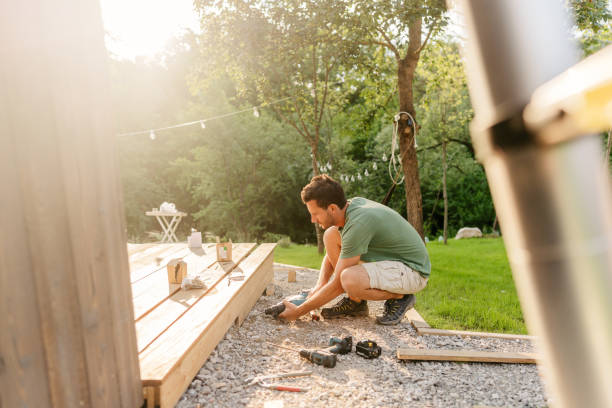Creating a useful and smart open-air space begins with one basic feature—a well-built deck. Whether you’re envisioning a cozy spot to unwind, a space to engage visitors, or an open-air kitchen, proficient deck building can turn your thoughts into reality.
What Is Deck Building?
Deck building in Taylor Mill KY alludes to the process of planning, building, and wrapping up open-air platforms—typically connected to a house or detached in a terrace. Made from wood, composite, or PVC materials, decks give level, steady surfaces ideal for seating, barbecuing, or lounging.

Services of Including a Deck on Your Property
A keenly developed deck upgrades both your home’s usefulness and tasteful request. A few services include:
- Increased property value
- More usable open-air space
- Improved check appeal
- Versatile utilization for get-togethers or relaxation
- Low-support alternatives available
Sorts of Deck Materials
Choosing the right fabric is fundamental for lifespan and appearance. Common alternatives include:
- Pressure-Treated Wood: Reasonable and broadly available.
- Cedar or redwood: actually safe from creepy crawlies and rot.
- Composite Decking: Made from reused plastics and wood filaments; requires negligible upkeep.
- PVC Decking: Completely engineered, solid, and weather-resistant.
- Each fabric has pros and cons depending on your budget, climate, and craved look.
Plan Thoughts for Your Custom Deck
Decks can be planned to suit any fashion or requirement. Prevalent plan highlights include:
- Multi-level decking
- Built-in seating or planters
- Pergolas or shade structures
- Deck lighting systems
- Hot tub or firepit integration
Working with an experienced deck builder guarantees that your plan thoughts are both down-to-earth and code-compliant.
The Deck Building Process
An ordinary deck-building extend takes after a few key steps:
- Consultation & Plan: You and the builder talk about thoughts and needs.
- Site Arrangement: The zone is cleared and measured.
- Foundation & Surrounding: Posts and joists shape the structure.
- Decking Installation: Sheets are laid and secured.
- Finishing Touches: Railings, stairs, and stains or sealants are added.
- Every extension is special, and timelines change based on estimates and complexity.
Why Contract a Proficient Deck Builder?
While DIY is enticing, contracting a professional ensures:
- Code compliance and permits
- Safety and auxiliary integrity
- Access to way better materials and warranties
- Skilled craftsmanship and consideration to detail
Experienced deck temporary workers offer assistance to help you maintain a strategic distance from expensive botches and convey high-quality results.
Support Tips for a Long-Lasting Deck
To keep your deck looking its best:
- Clean it frequently with a mellow cleanser and water.
- Inspect for free sheets or nails annually.
- Reapply recolor or sealant every 1–2 years (for wood decks).
- Clear snow and flotsam and jetsam to anticipate spoil or warping.
Composite and PVC decks require less upkeep, but normal cleaning is still essential.
Eco-Friendly Deck Building Options
If maintainability is important to you, consider:
- Composite decking made from reused materials.
- Responsibly sourced lumber certified by the Forest Stewardship Committee (FSC).
- Water-based stains and sealers to decrease chemical runoff.
Green deck building, as it were, not only ensures the environment but also includes long-term esteem for your home.
(FAQs)
Q1: How long does it take to construct a deck?
A little deck can be completed in 1–2 weeks. Bigger or more complex ventures may take 3–6 weeks, depending on climate, licenses, and custom features.
Q2: Do I require a permit to construct a deck?
Yes, most towns and cities require licenses, particularly for decks over a certain stature or estimate. A proficient builder will, as a rule, handle the allowance process.
Q3: What is the best time of year for deck building?
Spring and early summer are well-known times, but drop moreover offers gentle climate and low-season temporary worker availability.
Q4: Can a deck be built on uneven ground?
Yes. Proficient builders utilize bolster posts and reviewing procedures to construct steady decks on inclines or uneven terrain.
Q5: Is composite decking worth the cost?
While more costly upfront, composite decking endures longer, requires less support, and doesn’t decay or fragment like wood—making it a cost-effective choice in the long run.
Conclusion
Whether you’re arranging a patio withdrawal or expanding your home’s esteem, best deck building offers both magnificence and work. From fabric determination to format plan and wrapping up points of interest, proficient deck development brings your open-air vision to life.
